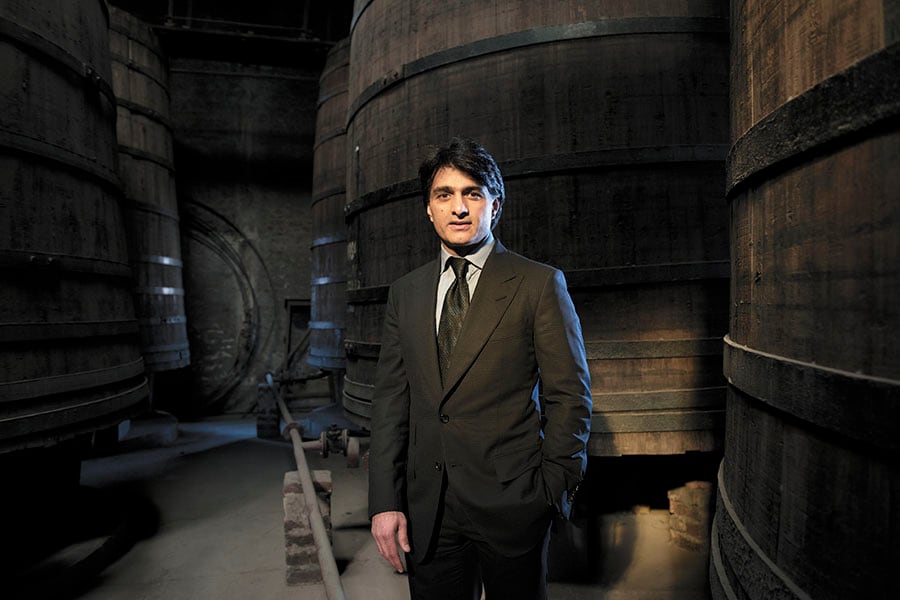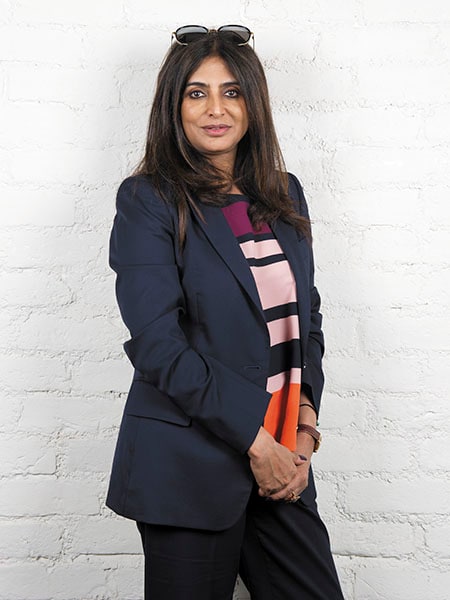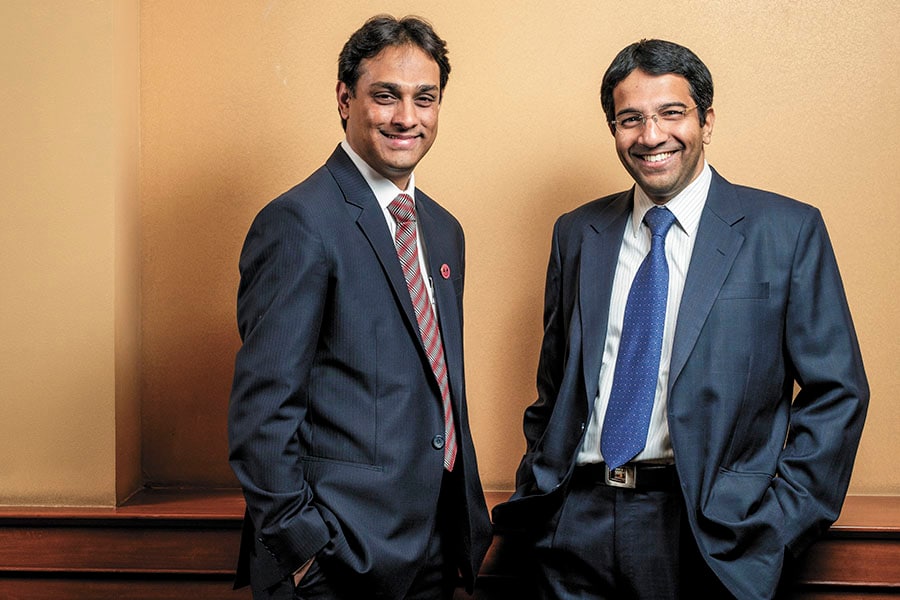Next gen in liquor businesses: In good spirits
The new generation leaders at three family-owned liquor businesses are trying to reassert their storied brands and create new niches


 Vinay Mohan, director, Mohan Meakin, is working towards a number of extensions for brand Old Monk
Vinay Mohan, director, Mohan Meakin, is working towards a number of extensions for brand Old Monk
Image: Amit VermaOperating in India’s over 300 million case-strong (each case equivalent to 9 litres) spirits market is not for the faint-hearted and the meek, given that the trade is highly regulated by respective state government agencies. In spite of the various challenges, the country’s spirits market, which grew at a compound annual growth rate of 9.4 percent between 2007 and 2016, remains attractive not just for global companies, but also for Indian players.
Though at present more than half the market is dominated by two multinational companies—French-based Pernod Ricard, which has built its operations from bottom up in India, and global spirits giant Diageo Plc, which bought a controlling stake in India’s largest spirits company United Spirits Limited (USL)—there are several legacy family-owned businesses that are trying to reassert their brands and create new niches. And much of the effort is being led by the third-generation family members at companies such as Mohan Meakin, Jagatjit Industries and Amrut Distilleries. [The only sizeable Indian player left in the market is Kishore Chhabria-led Allied Blenders and Distillers, maker of Officer’s Choice whisky.]
At one point, Mohan Meakin and Jagatjit Industries boasted of powerhouse brands such as Old Monk rum and Black Knight whisky, and Aristocrat whisky, respectively. These brands bottomed out with the entry of global brands and premium product offerings by larger rivals, post liberalisation. “Aristocrat whisky was a path-breaking brand launched when I was in shorts,” recalls Vijay Rekhi, 72, former managing director of USL. “And Black Knight of Mohan Meakin was a whisky that everyone had at the top of their mind.”
He believes the time is ripe for disruption in the Indian spirits market and some of these legacy brands, if managed well and “have access to an unfettered availability” of working capital, could make a comeback. The next generation leaders of these family-owned spirits businesses certainly have plans for their brands—and a clear path laid out.
The Return of the Monk
Brothers Hemant, 50, and Vinay Mohan, 46, both of whom were schooled at Mount St Mary’s School, Delhi Cantt, grew up hearing stories about the pluckiness of their grandfather Narendra Nath Mohan.
In the pre-Partition years, Narendra had been associated with Murree Brewery, one among many breweries run by the erstwhile Dyer Meakin Breweries (set up by the family of Colonel Reginald Dyer of the Jallianwala Bagh infamy), located in the erstwhile Punjab Province. Post Partition, he moved from Pakistan to India and started supplying bottles to Dyer Meakin Breweries, which operated breweries and distilleries in North India and was listed on the London Stock Exchange.
undefinedThe time is ripe for disruption in the Indian spirits market legacy brands could make a comeback[/bq]
And then suddenly, one fine day two years after Partition, as Vinay recalls, “We were told that our grandmother’s jewellery and everything that my grandfather owned was pledged to buy the company.” Overnight, from supplying bottles to Dyer Meakin Breweries, “My grandfather became the owner of the company.”
Mohan Meakin, which was initially known as Mohan Meakin Breweries, is the maker of the iconic Old Monk rum and once-popular Black Knight whisky. In 2001, Old Monk, under the leadership of Hemant and Vinay’s uncle Brigadier Kapil Mohan, clocked sales of over 8 million cases (of nine litres each) to emerge as the world’s third largest selling rum brand after Bacardi and Tanduay.
Seventeen years on, much has changed at Mohan Meakin. Kapil Mohan, who was the managing director of the company for four decades, passed away on January 6 this year, leaving behind a storied legacy. His two nephews, the only third-generation family members in the business, are now tasked with reviving the fortunes of the company and its iconic Old Monk brand, which was launched in 1954.
Growing competition, entry of foreign players with deep pockets, and, some might argue, the lack of willingness of the promoters to scale the brand, saw Old Monk’s sales decline steadily to 3.8 million cases in 2016, as per data from global research firm IWSR. And Black Knight is no longer the popular whisky brand that Rekhi remembers.
Hemant and Vinay, who both have a degree in business administration, joined the company in 1991 and 1994, respectively. When Kapil Mohan stepped down as managing director in 2015-16, Hemant took over the reins. Vinay is currently a director in the company.
“We will definitely adapt to the changes [in the market], but we will still follow a principled way of working,” says Vinay.
Old Monk, which has considerable goodwill in the market, says Rekhi, “can actually be leveraged to bring it back to its former glory”. Sanjay Jain, an industry expert and director at boutique advisory firm Taj Capital, believes that if there is one Indian brand that has global resonance and potential, “it probably is Old Monk”.
According to Vinay, sales of Old Monk, which continues to be the company’s flagship brand, have started picking up and “are now touching 5 million cases”. Given that the liquor industry is highly regulated and politically controlled, Vinay says,
“The decline [of Old Monk] only happened in the [key rum drinking] southern states because the regulations were such that it became impossible for us to sell.” He adds, “Our sales in the southern states were close to 4 million, which had dropped to under a million. Now they are reaching 2 million.”
The brothers have also planned for a number of brand extensions for brand Old Monk, including ready-to-drink flavoured variants such as cola, cranberry and mojito that would be pitted against Bacardi Breezer. “There are formulations of rum and coffee as well,” adds Vinay. They are also focusing on their whisky portfolio and will soon relaunch the Solan Gold Single Malt. “The roadmap is clear: We want to achieve that great glory of what we were,” says Vinay.  Roshini Sanah Jaiswal is a third-generation scion of the Jaiswal family Image: Amit Verma
Roshini Sanah Jaiswal is a third-generation scion of the Jaiswal family Image: Amit Verma
A Toast to Aristocracy
“I was always told by my parents that I needed to carve out a path of my own,” says 49-year-old Roshini Sanah Jaiswal, the third-generation scion of the family-run Jagatjit Industries, makers of Aristocrat whisky. The family also owns Milkfood Ltd, makers of the eponymous brand of ghee. Her joining the family business, liquor or Milkfood, was never a certainty.
“And if I were to join the business, it was never to be Jagatjit, it was to be Milkfood,” says Roshini, who was eventually appointed as the chief restructuring officer at the loss-making Jagatjit Industries in January 2015. As the only child to carry forward the company legacy, her father Karamjit S Jaiswal gave her two options: Either sell the company or turn around the business.
The seven-decade-old Jagatjit Industries, which had the patronage of the erstwhile Maharaja of Kapurthala (in Punjab), was a fading star. Its once-popular Aristocrat brand of whisky had a 6.8 percent market share in the 76.45-million cases strong ‘regular whisky’ segment (where the price for a 750 ml bottle ranges between ₹250 and ₹290) as per IWSR data for 2016. Allied Blenders and Distillers’ Officer’s Choice and USL’s Old Tavern whiskies had a 31 percent and 15 percent market share, respectively.
Roshini, a double major graduate in economics and political science from New York University, decided to revive the fortunes of Jagatjit Industries. This, after she had spent over a decade in the food and beverage industry—she opened 180 Proof lounge bar in Bengaluru (in 2000) and F-bar (in 2003) in New Delhi.
“Being a legacy company, the biggest challenge was to make it lighter and leaner,” says Roshini. Since 2015, she has downsized the company’s employee headcount by 750 and has shut down a number of company-owned distilleries, like in Hyderabad, where “cost of production was too high”. She has also channelled time and money into relaunching the company’s flagship Aristocrat Premium brand. “We will be launching it in a new avatar soon and will also be launching two new brandies,” she says.
Even as the company reported a loss of ₹119 crore in fiscal 2017, Roshini says the company “has been at Ebitda break-even for the last five quarters and in the last two quarters we have been Ebitda positive”.
On January 11, Jagatjit Industries announced that it had raised ₹265 crore as debt from Indiabulls Commercial Credit Limited which would be used to retire a previous debt from private equity firm KKR and as working capital for marketing and business development needs. “We see they are working hard to turn around the company. They repaid the full loan before it was due,” Tashwinder Singh, managing director, KKR Capital Markets India Private Limited, had said at the time.
While the real turnaround may take a while, she’s taking steps in the right direction. Rakshit Jagdale (right) with brother-in-law Thrivikram Nikam, executive directors at Amrut Distilleries
Rakshit Jagdale (right) with brother-in-law Thrivikram Nikam, executive directors at Amrut Distilleries
Image: Nishant Ratnakar for Forbes IndiaIn Single Malt They Believe
The beginnings of the now-famous Amrut Single Malt Whisky can be traced back to 2002 when Rakshit Neelakanta Jagdale was doing his MBA dissertation at the Newcastle University in the United Kingdom (UK). Amrut Distilleries, which was established in 1948 by Rakshit’s grandfather Radhakrishna N Jagdale, had accumulated casks of high-quality, matured, Indian single malt whisky, a spin-off from producing blended whiskies.
“We had a lot of good [single malt] whisky that was maturing and my father [Neelakanta Rao Jagdale] was keen to see if there was a demand for such a product from India,” says Rakshit, now 39. Using that as the peg, Rakshit based his thesis on whether an Indian single malt whisky had the scope of doing well, particularly in the UK, home of the world’s best-selling single malt whiskies.
As part of his thesis, Rakshit imported duty-paid samples of Amrut’s single malt whisky and blind-tested the product in restaurants and pubs in the UK. The response was good and the result of his dissertation was that in August 2004, Amrut Distilleries launched the Amrut Single Malt Whisky, in Glasgow, UK.
Today, the brand is exported to over 44 countries and clocked sales of about 25,000 cases in 2016, according to IWSR data. There are 25 variants of the Amrut Single Malt Whisky of which the Amrut Fusion Single Malt Whisky variant is the company’s bestseller. Whisky connoisseur Jim Murray rated the product as the third finest whisky in the world in his 2010 edition of the Whisky Bible. Amrut Single Malt Whisky is another brand that Sanjay Jain of Taj Capital believes has global appeal.
Born and brought up in Bengaluru, Rakshit is the eldest of the two children of Neelakanta Rao Jagdale, chairman and managing director of Amrut Distilleries, a company known in South India for its value-priced brands Old Port rum and Silver Cup brandy. The two brands accounted for about 50 percent of the company’s ₹280 crore turnover in fiscal 2017, and are largely retailed in Kerala and Karnataka.
Rakshit, along with his brother-in-law Thrivikram G Nikam, are executive directors in the company and overlook critical functions such as marketing, production, and supply chain. While family patriarch Neelakanta Rao Jagdale is still very much at the helm of affairs, the transition of power to the next generation leaders is beginning to take shape.
“The thrust of our generation will be on premiumisation, growing our footprint across India and on our single malt business,” says Rakshit. Over the last five years, Amrut Distilleries has launched three premium product offerings: Two Indies Rum, MaQintosh Silver Edition, a blended whisky, and Amrut Amalgam, a blended malt whisky.
Even as the company’s two value-priced brands dominate the southern markets of Karnataka and Kerala, Rakshit and Nikam are eyeing a pan-India presence with their premium product offerings. In the last two years, Amrut Distilleries started retailing its premium products in newer markets such as West Bengal, Punjab and Haryana, among others.
“The next-generation [of legacy Indian spirits companies], having seen the writing on the wall, are trying to have a presence in the premium end of the market by focusing only in certain states and intelligently pricing their products with respect to the MNC brands,” says Jain. A point Rakshit concurs with. “To take our mass volume brands across India would require large investments, which we are not prepared to make. Instead, we would like to put in the same effort and push our premium brands,” says Rakshit.
First Published: Feb 23, 2018, 07:27
Subscribe Now